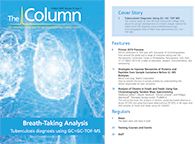Agilent Announces Thought Leader Award Winners
Agilent Technologies has awarded Paul Bonnington and Kimbal Marriott an Agilent Thought Leader Award in support of their innovative research into data analytics, machine learning, artificial intelligence, and information visualization.
Agilent Technologies (Santa Clara, California, USA) has awarded Paul Bonnington and Kimbal Marriott an Agilent Thought Leader Award in support of their innovative research into data analytics, machine learning, artificial intelligence, and information visualization.
Based at Monash University, Melbourne, Australia, Bonnington and Marriott will receive funding and Agilent instrumentation to facilitate and accelerate their research. Drawing upon Monash University’s vast knowledge and experience, Bonnington and Marriott are developing new, innovative, and smarter analytical products that will increase laboratory efficiency, as well as support mechanisms that will significantly reduce customer downtime.
“There are exciting new discoveries awaiting us when we bring advanced scientific instrumentation together with the advanced data processing capabilities of the Faculty of IT and the eResearch Centre,” stated Paul Bonnington, Director eResearch Centre, Monash University.
“The recent great advances in artificial intelligence, data science, and human-computer interaction allow us to reimagine the scientific research laboratory. For the first time we can build a lab that puts the scientists first, not the scientific instruments,” stated Kim Marriott, Director Computer-Human Interaction and Creativity Group, Faculty of IT, Monash University.
The Agilent Thought Leader Programme promotes fundamental scientific advances by contributing financial support, products, and expertise to the research of influential thought leaders in the life sciences, diagnostics, and chemical analysis space.
For further information, please visit: www.agilent.com

Analysis of PFAS in Milk by LC-MS/MS
May 15th 2025Dairy milk is one commodity that can be impacted by environmental contaminants, such as PFAS, so it is important to implement extensive, robust, and accurate testing. In this work, a sensitive and reliable method was developed for the analysis of PFAS in milk by LC-MS/MS at levels as low as 0.01 µg/kg.

.png&w=3840&q=75)

.png&w=3840&q=75)



.png&w=3840&q=75)



.png&w=3840&q=75)











